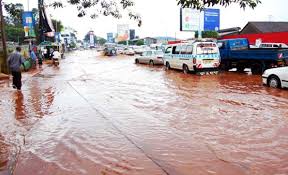Source: pmldaily.com
MBALE – The erratic unprecedented heavy rains in Mt Elgon sub-region indicate that farmers in this sub-region face a wide range of agricultural production risks.
The tragic reality is that the earth is reaching a tipping point faster than ever before and since Uganda is heavily dependent on rain-fed agriculture, most impact of climate change will be decreased agricultural production leading food shortages.
A 2019 weather review by the Uganda National Meteorological Authority forecasted heavy rainfall across the country punctuated with lightning and flooding that would lead to increased disease outbreak.
The UNMA has subsequently warned of the negative impact of the weather, including increased pests and diseases, destruction of crops, high post-harvest losses, water logging, and soil erosion.
The agency has also warned of the health impact, including malaria upsurges countrywide, more outbreaks of typhoid and cholera particularly at fishing sites and in Bududa, Bulambuli, Kisoro, refugee camps, as well as Bilharzia around Lake Albert and Lake Victoria.
“Overall, there is an increased likelihood of near normal to above normal over most parts of Uganda,” the September to December (SOND) 2019 seasonal rainfall outlook for Uganda issued early September indicates.
According to Mr Bob Natifu, as assistant commissioner for Climate change, Climate change and variability present new risks and vulnerabilities.
Revealed that the changes in climate today include erratic rainfall onset and cessation (which were either early or late), poor seasonal distribution of rainfall and decreased rainfall.
He explained that Climate related risks such as heavy rainfall patterns, prolonged dry seasons are going to become more frequent and intense with negative impacts on agricultural livelihoods and food security.
He said further that there is evidence that Uganda’s climate is changing and threatening the environmental, social and economic development, including the agricultural sector.
Ms Sarah Bisikwa, the Manafwa district natural resources officer/ district environment officer said in Uganda, climate change and increased weather variability has been observed and is manifested in the increase in frequency and intensity of weather extremes, including erratic rainfall patterns and high temperatures leading to prolonged drought.
She revealed that the country is now facing rising heavy rainfall patterns that are scattered across the country, flooding, mudslides and storms due to climate change.
Scientists suggest the adverse effects of climate change we are suffering today are from decade old emissions. This justifies why individuals, households and communities must learn to adapt.
Reports from the Climate Change Unit in Uganda by the Intergovernmental Panel on Climate Change indicates that the earth’s average surface temperature has risen by 0.76 degrees Celsius and will continue to rise and cause adverse effects on the agricultural production.
The reports reveal that Uganda is mainly affected by human-induced climate change and that the human-induced climate change is likely to increase average temperatures in Uganda by up to 1.5 ºC in the next 20 years and by up to 4.3 ºC by the 2080s.
In order to fight the effects of Climate change, the ministry of water and environment suggests that we actively engage in the climate change policy making process that begun early 2012 and will be concluded by the end of the year.
It adds that Uganda has to also influence global climate change policy making through participating in the annual Conference of Parties to the UNFCCC. We have built alliances with regional and international, like-minded CSOs such as PACJA and CAN-I, CLACC.
“And besides, we should also subscribe to annual International Conferences on Community Based Adaptation that bring practitioners, scientists and policy makers together to discuss the practicalities of making adaptation work and foster networking for continued information exchange at the national level, the Climate Change Action Network-Uganda,” said Mr Natifu.
Mr Charles Wakube, the Mbale district environment Officer said the government needs to urgently review and make institutional capacity to conceptualise climate compatible development projects as well as increase and manage climate finance.
